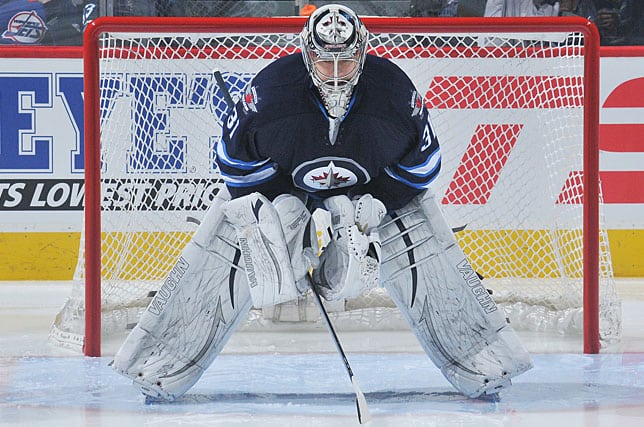
Ondrej Pavelec, the worst decision the Winnipeg Jets have made so far
When the Jets locked in Ondrej Pavelec for five years, it committed them to a subpar goalie and took them out of the running for other, better keepers who have become available since. It was the safe move, not the right move.
 Ondrej Pavelec, the worst decision the Winnipeg Jets have made so far
Ondrej Pavelec, the worst decision the Winnipeg Jets have made so farClaude Noel needed to go, but Ondrej Pavelec is the heavier weight holding the Jets back.
Since last season, I’ve been a proponent for getting a new man to call the shots behind Winnipeg’s bench. With so little growth from a roster with so much potential, a shake up was needed – and in situations like these, it almost always starts with the coach.
But, fairly, much of the blame has fallen on GM Kevin Cheveldayoff since he decided to swap in Paul Maurice on an interim basis. Cheveldayoff has done little in terms of personnel moves to boost his roster, but that’s something you also want to be cautious of when you’re managing a core of players this young. You don’t want to bail before they hit their primes. In that sense, you can’t really fault the GM for not trading away Evander Kane, Dustin Byfuglien, Tobias Enstrom, Blake Wheeler – or whoever – before at least trying a new voice behind the bench. But you can fault Cheveldayoff for two other things.
The first is that it took him so long to change the coach. Last season was the second time in two years that the Jets roster melted down the playoff stretch. In the short season, they finished 8-9-1 in their last 18 games. This stretch included a five-game winning streak, which came right after a five-game losing streak from March 28 to April 4 that doomed their season. They also lost their last two games and missed the post-season by four points. Two seasons ago the Jets won only three of their final 11 games to spiral out of the race. That season they missed the playoffs by eight points, despite holding the No. 8 seed with one month left on the schedule.
The second thing you can fault Cheveldayoff for is his decision to lock down goalie Ondrej Pavelec to a five-year contract. This, above all else, is the worst move the Jets have made and has had the biggest impact on their subpar fortunes.
First, the least egregious part of the deal: money. Pavelec is making $3.9 million against the salary cap, which ranks him 17th among NHL goalies. As the cap rises that total will seem less and less audacious, but at the time it was made, Pavelec got about the same money as fellow restricted free agent Cory Schneider got on a three-year pact. It’s not a bad rate for a starting NHL goalie, but the cold hard fact is that Pavelec’s play has been on par with a backup since the move to Winnipeg. As a Jet, Pavelec’s save percentage has never ranked in the top 30 league wide.
The five-year term is the real sticking point here as it a) committed the team to a so-so goalie and b) took the budget team out of the market for better netminders who have been made available since.
When Pavelec signed his deal in June of 2012, he was coming off a season in which he registered a pedestrian .906 save percentage. Since then, Ben Bishop was traded for Cory Conacher (a high scoring rookie at the time) and a fourth-round pick, Schneider was traded for the No. 9 pick and Jonathan Bernier was acquired by Toronto for Matt Frattin, Ben Scrivens and a draft pick. Heck, Tim Thomas even came back from retirement to join the lowly Panthers. Each one is having a better year than Pavelec. The Jets could have swallowed any one of those asking prices if they needed to.
A slew of other goalies have also had their names appear in rumor mills since Pavelec signed. The goaltending position has been flush with available assets and though it’s impossible to say whether or not the Jets would have landed one of them via trade or some other route, they would have at least been in the running. They certainly would have felt the pressure to make a move, which could have expedited the process.
But because they invested in Pavelec, the Jets weren’t serious players for any of these goalies. And today, the Czech netminder has an .898 SP, which is 23 points worse than backup – and recovery project – Al Montoya.
The Jets signed Pavelec because, without him, they wouldn’t have had a proven NHL goalie in place. The problem is, Pavelec never was a proven NHL goalie in the first place, enjoying one anomalous season in 2010-11 when he posted a .914 SP in 58 games with the Thrashers. This doesn’t make him worth a five-year commitment.
The Jets signed Pavelec because it was the safe thing to do, not the prudent one.
That characteristic has become all too familiar with the Winnipeg management team – and one that’s providing zero results.